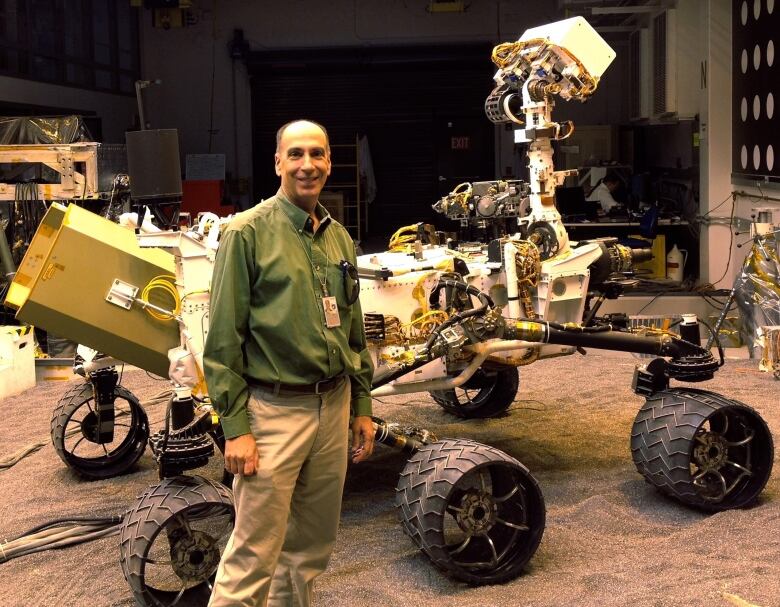Are we living in a computer simulation? It's more likely than you might think, scientist argues

From cyberpunk classics like Neuromancer and The Matrix, to the upcoming virtual reality-fuelled film Ready Player One, pop culture has long been fascinated with the idea of living inside a computer simulation of the physical world.
Scientists and philosophers have also been arguing about the idea for years, with some saying it's not a question of when living in a digital realm will be possible, but whether we're already there.
"It is something that even the Greeks have thought about: dreams within dreams," says Rich Terrile, an astronomer and director of the Center for Evolutionary Computation and Automated Design at NASA's Jet Propulsion Laboratory.
The universe, he says, obeys fundamental principles, and as we get better at understanding those rules, we'll be better able to reproduce our natural environments in digital form.
"You can simulate the universe," he tells The Current's Anna Maria Tremonti, "with a series of equations you can carry around in your pocket."
Proponents of the theory go further, to suggest that these breakthroughs have already happened, and what we perceive as our existence is just a simulation within an unseen world.
That means that you, reading this article, may not actually be a flesh-and-blood person reading an article. You may be a consciousness expressed in a series of 1s and 0s — a pixel person unwittingly living inside a computer program.
Confused? Take a deep breath (if you're actually breathing), and let's explore.

Universe building
The universe, Terrile says, is computable. Its discrete elements can be understood individually, as well as within a wider mathematical framework that predicts the way the natural world behaves.
He says these observations could be used to simulate environments that feel so real they are indistinguishable from the reality that we see.
We have already seen this idea progress in video games, which have evolved from simple games like Pong a few decades ago, to today's immersive, highly detailed 3D worlds.
"If we're able to do that," he says, "then it's reasonable to think that in the very near future we will have the ability to digitally live within these simulations."
The technology already exists
The technology to do it is already all around us, Terrile says, and computing speeds are only getting faster.
He notes that the biggest, fastest computers used in the 1969 moon landing can now fit in your pocket.
"I'm not talking about cellphones, I'm talking about key fobs," he says.
"A human brain calculates at something in the order of a million-billion operations per second. And this is about 100 times slower than our fastest super-computers."
Has it already happened?
If one accepts that this is likely to happen, some argue it may have already happened without us realizing it.
"Might we not be a few years, a few decades in the future in reality," asks Terrile, "actually living in one of these created simulations?"
According to this theory, we might be living inside a simulation of what we perceive to be the so-called real world — set up by someone in a more technologically advanced society.
- CBC NEWS: The idea of robot butlers fuels our fantasies — and our fears
- CBC NEWS: Self-driving cars could ease traffic, but increase sprawl
What's more, that society could be a version of ourselves in the future — your current consciousness a construction of its creator's personal memories.
It may also be someone or something unimaginable, in a universe that looks nothing like the one you think you live in.
'If we can't measure it, it can't be science'
The apparent inability to discern whether we're living in a simulation — unless you're able to bust out of the machine like Neo in The Matrix, perhaps — has led scientists to criticise the idea.
"Science is about things we can measure," says theoretical physicist Sylvester James Gates Jr., "and if we can't measure it, it can't be science."
If you can't disprove the idea, he says, you can't prove it.
- QUIRKS & QUARKS: A computer taught itself the toughest game on the planet. And it's just getting started
- THE CURRENT: Meet the woman who saved Stephen Hawking's voice
Terrile acknowledges that there is no concrete evidence for the theory. But that doesn't mean it's not true, he argues.
"500 years ago people were making the same arguments about the nonsense that the Earth isn't the centre of the universe," he says.
"We were stuck with this kind of fundamental assumption. I think as a scientist we always need to be questioning our assumptions."
Listen to the full conversation at the top of this page, where you can also share this article across email, Facebook, Twitter and other platforms.
This segment was produced by The Current's Kristin Nelson.